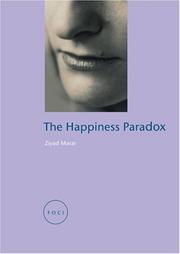| Listing 1 - 6 of 6 |
Sort by
|
Book
ISBN: 1317488695 1315710358 1282947389 9786612947384 1844654206 9781317488699 9781844651511 1844651517 9781315710358 9781317488675 9781317488682 9781138175747 1317488687 Year: 2008 Publisher: Stocksfield Acumen
Abstract | Keywords | Export | Availability | Bookmark
 Loading...
Loading...Choose an application
- Reference Manager
- EndNote
- RefWorks (Direct export to RefWorks)
Most of us think we are about 15 per cent cleverer, nicer, more attractive and better drivers than others think we are. It seems deception begins at home. After all the most convincing liars convince themselves first. Sellers and buyers, parents and children, friends and lovers must conceal from each other the unutterable truth that they dont believe or want the same things. In this book, Ziyad Marar throws a revealing light on the many ways deception is woven into the texture of human life: our wiring leaves us easily suckered by persuasive illusions, while our contradictory desires (for sex and honesty, money and kindness, for cake and losing weight) force us to cook up self-serving stories. We manage flattering impressions with effortless skill, while pretending our sins and self-indulgences are beyond our control. Drawing on insights from philosophy, psychology and literature Marar explores the implications for living well in the shadow of Kants humbling thought that out of the crooked timber of humanity, no straight thing was ever made.
Deception. --- Self-deception. --- Deception --- Defense mechanisms (Psychology) --- Self-perception --- Chicanery --- Deceit --- Subterfuge --- Truthfulness and falsehood --- Intrigue --- Philosophical anthropology --- General ethics
Book
ISBN: 1315729407 1844658228 1317545826 1844655288 9781317545828 9781315729404 9781317545804 131754580X 9781317545811 1317545818 9781844655274 184465527X 9781844658220 Year: 2012 Publisher: Durham : Acumen Publishing,
Abstract | Keywords | Export | Availability | Bookmark
 Loading...
Loading...Choose an application
- Reference Manager
- EndNote
- RefWorks (Direct export to RefWorks)
The hope for intimacy lies deep within us all. That moment of feeling uniquely understood, the antidote to isolation, is what gives us value, validation and self-belief. But as Ziyad Marar shows in this fascinating and engaging study, intimacy is a tricky business. The prevalence of social media, for example, is a sign of our desire for human connection, yet is a symptom of how little we truly achieve it. Often confused with love, intimacy is in many ways more important. Marar's investigation and celebration of this elusive but profound human experience shows how intimacy is central to a life well lived. But how do we spot the real thing? Marar helpfully identifies a key set of ingredients - reciprocity, conspiracy, heightened emotion, kindness - that when brought together enable the strongest experiences of intimacy. Without these four characteristics in the mix we are experiencing something less, or something else. Drawing on a wide range of sources - from key thinkers, as well as telling examples from familiar films and novels - Marar illustrates the subtlety and intricacies of intimacy and shows how closely it is bound up with notions of trust, control, risk and our own insecurities. Intimacy, argues Marar, is a necessary component of a fulfilled life. Yet we should not take for granted that we know what it is and how to get it. A better understanding of this powerful experience and the many barriers to achieving it may just help us to brave the search for it. For anyone bold enough to do so, which should be all of us, Intimacy is required reading.
Intimacy (Psychology) --- Emotions --- Interpersonal relations --- Love --- 177.61 --- 177.61 Liefde. Genegenheid --- Liefde. Genegenheid

ISBN: 1861891822 9781861891822 Year: 2003 Publisher: London Reaktion Books
Abstract | Keywords | Export | Availability | Bookmark
 Loading...
Loading...Choose an application
- Reference Manager
- EndNote
- RefWorks (Direct export to RefWorks)
"Ziyad Marar shows how the happiness we seek remains highly elusive, and that much of the energy devoted to searching for it is wasted, even self-defeating. He argues that happiness is a deceptively simple idea that will always be elusive because it is based on a paradox: caught between the need for adventure or self-expression on the one hand and the hope of appreciation or belonging on the other we suffer perpetually from too much or too little. We are riven by conflict in wanting to feel good while simultaneously trying to be good. It is the conflict, for example, between the desire to break rules in order to feel free, and the need to follow rules in order to feel justified. These tensions permeate what Freud called the two central aspects of a happy life: love and work."--BOOK JACKET.
Happiness --- Love --- Work --- 159.9 --- CDL --- Work, Psychology of --- Affection --- Emotions --- First loves --- Friendship --- Intimacy (Psychology) --- Gladness --- Cheerfulness --- Contentment --- Pleasure --- Well-being --- Psychological aspects --- Philosophical anthropology --- Happiness. --- Psychological aspects.
Book
ISBN: 9781474298339 9781474298322 9781474298346 Year: 2018 Publisher: London Bloomsbury Academic, an imprint of Bloomsbury Publishing Plc
Abstract | Keywords | Export | Availability | Bookmark
 Loading...
Loading...Choose an application
- Reference Manager
- EndNote
- RefWorks (Direct export to RefWorks)
Book
ISBN: 9789025906641 Year: 2018 Publisher: Utrecht Ten Have
Abstract | Keywords | Export | Availability | Bookmark
 Loading...
Loading...Choose an application
- Reference Manager
- EndNote
- RefWorks (Direct export to RefWorks)
Film
ISBN: 9781473999923 Year: 2017 Publisher: United Kingdom : SAGE Publications Ltd,
Abstract | Keywords | Export | Availability | Bookmark
 Loading...
Loading...Choose an application
- Reference Manager
- EndNote
- RefWorks (Direct export to RefWorks)
In a keynote presentation, Professor Gary King describes how big data has changed and drastically expanded the capacity of social science to understand the world around us. He cites many examples of how big data is being applied in research, including studies on Social Security forecasting, Chinese censorship, and gerrymandering.
Big data. --- Social sciences --- Research --- Methodology.
| Listing 1 - 6 of 6 |
Sort by
|

 Search
Search Feedback
Feedback About UniCat
About UniCat  Help
Help News
News